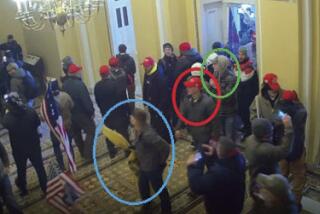U.S. Recalls All 28 Guards From Embassy in Moscow
- Share via
WASHINGTON — All 28 Marine guards at the U.S. Embassy in Moscow were called home Monday to “facilitate an investigation” of charges that two guards gave secret documents to Soviet spies and allowed them to roam around the building’s most sensitive areas at night.
In a joint announcement, the State Department and the Marine Corps said the guards were ordered to return to the corps base at Quantico, Va.--headquarters for the diplomatic guard program--as soon as other Marines arrive to replace them. The announcement said the “rotation” would be completed by the end of April.
State Department spokeswoman Phyllis Oakley described the action as “a precaution.” She said there is no evidence of wrongdoing by any of the Marines other than the two already arrested, Sgt. Clayton J. Lonetree, 25, and Cpl. Arnold Bracy, 21.
She said investigators want to interrogate the guards about the activities of Lonetree and Bracy and about the overall security situation that made the espionage possible.
“It simply will be easier to question these people here than in Moscow, where they would have other duties,” Oakley said.
Nevertheless, the mass replacement of all guards is unprecedented. Under normal military discipline, the Marines can be kept under close surveillance at Quantico pending completion of the investigations.
Meanwhile, Lonetree underwent a mental test Monday at Bethesda Naval Medical Center to determine if he is fit to stand trial, Capt. Craig Fisher, a Marine spokesman, said. He was returned to the brig at Quantico later in the day.
Oakley said the State Department has not lost confidence in the elite Marine program, which has supplied guards for diplomatic installations around the world since the end of World War II. She said there would be no such replacement of Marines at other posts, including the U.S. Embassy in Vienna where Lonetree allegedly also supplied information to Soviet spies.
She said she assumed that all 28 guards eventually would be reassigned to other diplomatic posts.
Sexual Involvement
The Marine Corps said Lonetree and Bracy became involved sexually with Soviet women working in the embassy. According to official documents, the women urged them to spy and introduced them to KGB agents.
A U.S. intelligence source questioned the wisdom of sending young and vulnerable Marines to Moscow, where the Soviets have long been known to use female agents in an effort to compromise Westerners.
“They should have known that they wouldn’t have a plump little babushka approaching these guys, but some really attractive women,” the source said.
The source said the instructors at the school for Marine guards at Quantico “must be standing on their heads, because these guys did everything they taught them not to do.”
Former CIA Director Stansfield Turner, interviewed Monday on ABC-TV, said security precautions at the embassy are lax. He urged routine lie-detector testing of Marine guards and suggested use of remote-control cameras to check on them.
Must Be Unmarried
About 1,400 Marines guard 134 U.S. embassies around the world. By regulation, the guards must be unmarried.
Lonetree has been charged with 24 counts of misconduct, including espionage, which can carry the death penalty. The Marine Corps said he gave the Soviets documents concerning U.S. intelligence operations and allowed Soviet spies to search the embassy at night.
Bracy has not yet been charged officially, but Marine spokesmen have said he is suspected of aiding Lonetree and sometimes serving as a lookout.
Marine regulations require the guards to work in pairs, partly to prevent one guard from allowing unauthorized people into the embassy without being observed by the other. However, Lonetree and Bracy often worked together.
William M. Kunstler, Lonetree’s attorney, said the Marine gave conflicting statements in three interviews last year. He said the official record of Lonetree’s interrogation indicates that the investigators recorded “what they wanted to hear.”
‘So Conflicting’
“They were taken over a five-day period,” Kunstler said in a telephone interview. “They are not in his handwriting and often they are not even verbatim. They’re so conflicting that obviously something is wrong, and at one point they told Lonetree he should say anything (even if it was untrue). I think they were stimulating his fantasies.”
Moreover, Kunstler said much of the case against Lonetree was based on a statement by Bracy that Bracy later recanted.
Kunstler confirmed a report by the New York Times summarizing the 23-page record of Lonetree’s interrogation. The document said Lonetree described his sexual involvement with a Soviet woman employed as a translator at the embassy. He said the woman later introduced him to a man, apparently a KGB agent, who she said was her uncle “Sasha.”
Lonetree said “Sasha” pressed him for information, starting with the names of American alcoholics, drug addicts and homosexuals who might be susceptible to blackmail.
Times staff writer Ronald J. Ostrow contributed to this story.
More to Read
Sign up for Essential California
The most important California stories and recommendations in your inbox every morning.
You may occasionally receive promotional content from the Los Angeles Times.












